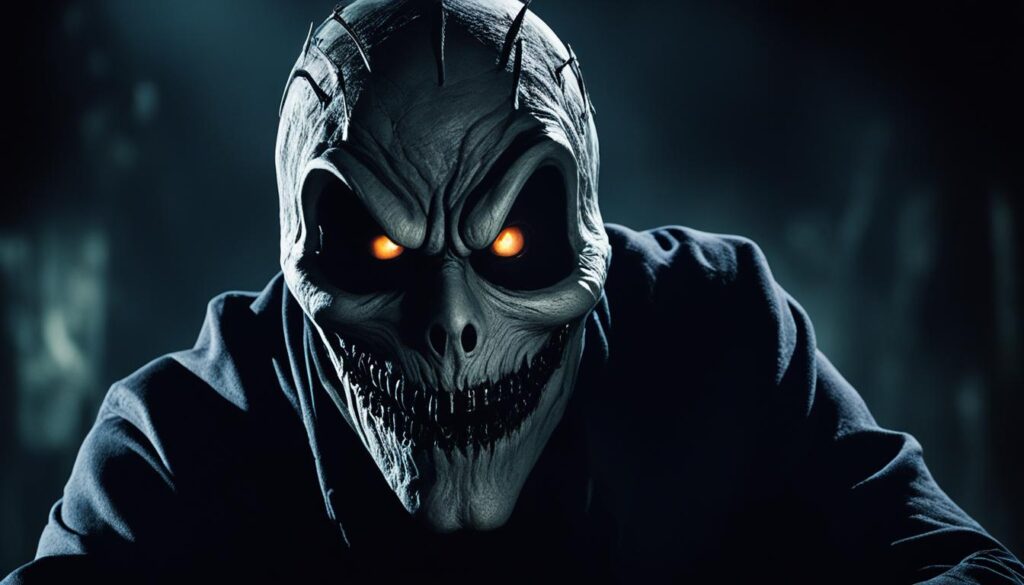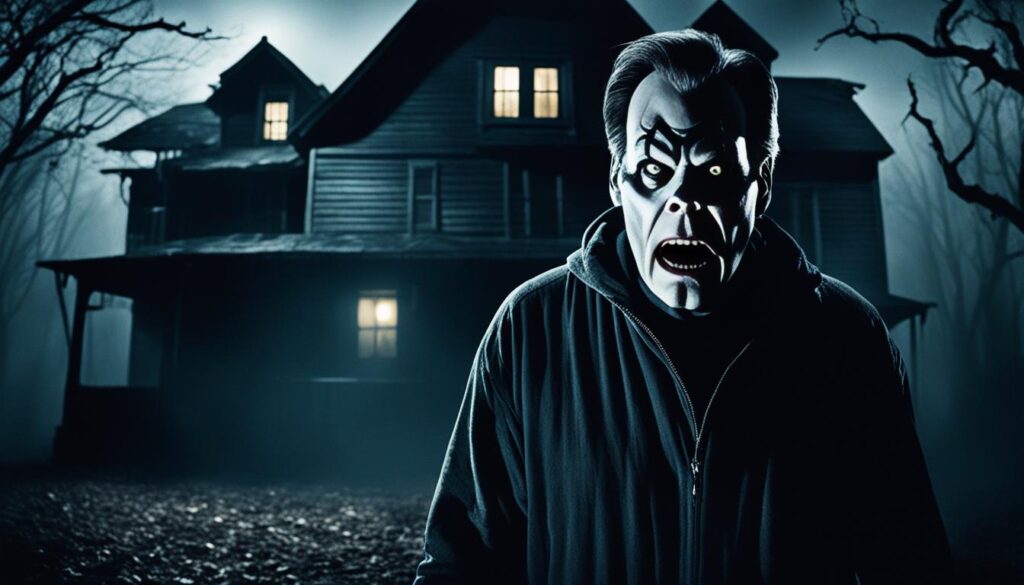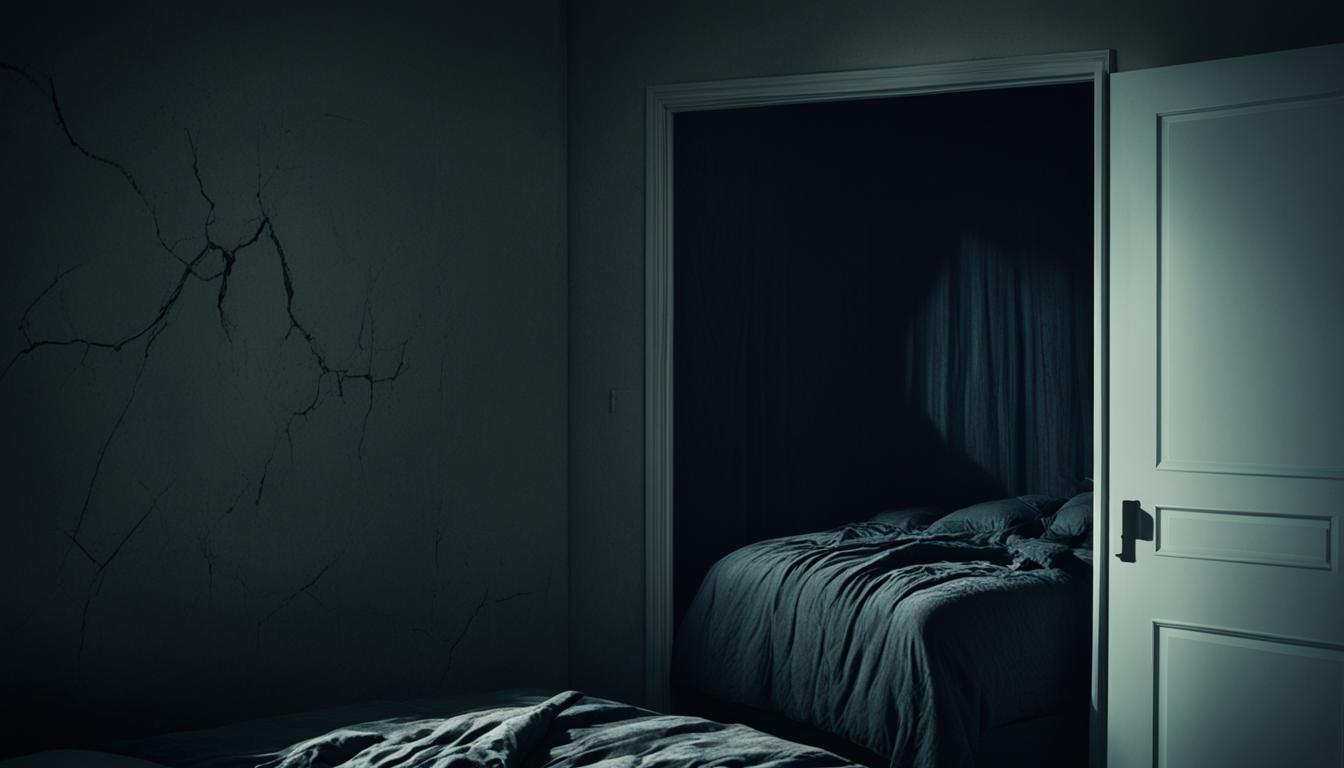For horror fiction enthusiasts, Stephen King needs no introductions. Over the decades, the master of macabre has established his dominance in the genre with numerous classic novels and short stories that continue to scare readers to this day. “The Boogeyman” is one such story that has cemented its position as a favorite among horror fans for its suspenseful plot, chilling imagery, and Stephen King’s trademark writing style.
If you’re looking for a spine-tingling read, “The Boogeyman” is a must! This story will draw you into a world of fear and supernatural suspense, leaving you unable to put this short story down until you’ve read every last word. Read “The Boogeyman” now and enter the world of Stephen King!
Key Takeaways:
- Stephen King is a renowned horror author with an extensive bibliography.
- “The Boogeyman” is a chilling short story that showcases King’s ability to build suspense and evoke fear in readers.
- The story centers around a man confessing to a psychiatrist about the mysterious deaths of his young children and his belief in a supernatural entity being the culprit.
- Stephen King’s writing style is known for creating vivid and immersive worlds that stay with readers long after the story is over.
Who is Stephen King?
Stephen King is a renowned author who has become a household name in the realm of horror and suspense. Born in Portland, Maine, in 1947, King published his first novel, Carrie, in 1974. Since then, he has written numerous bestsellers and become one of the most prolific and influential authors of our time.
King is widely recognized for his ability to craft compelling and terrifying narratives that draw readers in and keep them on the edge of their seats. Over the years, he has amassed a vast collection of works, including novels, short stories, novellas, and screenplays, showcasing his versatility and skill as a writer.
King’s impact on the horror genre cannot be overstated. He has inspired countless writers and filmmakers, and his work has shaped popular culture in profound ways. Through his vivid characters, gripping plots, and evocative writing style, King has established himself as a literary icon and cemented his place in history as one of the greatest horror writers of all time.
The Synopsis of “The Boogeyman”
In “The Boogeyman,” a short story by renowned horror author Stephen King, protagonist Lester Billings confesses to his psychiatrist about the mysterious deaths of his three young children. He attributes their deaths to the Boogeyman, a malevolent presence that he believes is responsible for their murders. Throughout the story, Lester grapples with his guilt and the fear that the Boogeyman will come after him next.
The story is structured around Lester’s confessions to the psychiatrist, revealing the events leading up to the children’s deaths and the protagonist’s increasing paranoia. The tale is set in Lester’s home, which becomes increasingly menacing as the story progresses.
Ultimately, “The Boogeyman” delivers a chilling and suspenseful plot, demonstrating King’s skill at crafting horrifying tales of the supernatural.
The Themes and Symbolism in “The Boogeyman”
Stephen King’s “The Boogeyman” is crafted to evoke fear and disgust in readers. The plot revolves around a father’s guilt and his fear of the entity responsible for the untimely deaths of his children. The use of themes and symbolism serves to accentuate these emotions, leaving readers with a lasting impression long after they have turned the last page.
Themes
| Theme | Description |
|---|---|
| Fear of the Unknown | The fear of something that cannot be explained, and the helplessness that comes with it, is central to the story. The father experiences the terror of the unknown as he attempts to uncover the truth behind his children’s deaths. |
| Consequences of Unresolved Guilt | The father’s guilt over his role in his children’s deaths drives the story forward. His inability to come to terms with his feelings and confess his wrongdoing has severe consequences. |
Symbolism
Symbolism is present throughout “The Boogeyman” to emphasize the gravity of the situation. The use of symbolism ranges from subtle to overt and highlights the horrors that befall the father and his family.
- The Boogeyman himself symbolizes the father’s guilt and fear, which lead to the deaths of his children.
- The closet, where the Boogeyman is thought to reside, represents the father’s reluctance to confront his guilt and the unknown.
- The psychiatrist’s office symbolizes the father’s psychological trauma and his attempt to confront his guilt.
The themes and symbolism in “The Boogeyman” work together to create a haunting and unforgettable tale. As readers delve into the story, they are taken on a journey of fear, guilt, and horror that will stay with them long after they have finished reading.
Characters in “The Boogeyman”
Stephen King’s “The Boogeyman” features several significant characters that contribute to the story’s eerie and haunting nature. The protagonist, Lester Billings, is a grieving father who tragically lost all three of his children to a mysterious force that he believes to be the titular Boogeyman.
Throughout the story, readers are introduced to each of Lester’s deceased children, offering glimpses into their personalities and relationships with their father. Additionally, the psychiatrist that Lester confides in, Dr. Harper, serves as a crucial sounding board for Lester’s fears and anxieties.
The Boogeyman itself is a shadowy and malevolent presence that lurks in the corners of Lester’s life, reminiscent of classic horror figures. The characters and their motivations are woven together skillfully by King, providing a chilling and well-rounded reading experience.

The Characters of “The Boogeyman” and Their Significance
| Character | Description | Significance |
|---|---|---|
| Lester Billings | Grieving father who has lost all three of his children to the Boogeyman. | Protagonist and the vessel through which readers experience the terror of the Boogeyman. |
| Bill, Carl, and Susan Billings | The three deceased children of Lester, briefly characterized by their father’s memories. | Provide context and emotional depth to Lester’s grieving process and his determination to take down the Boogeyman. |
| Dr. Harper | Lester’s psychiatrist, who he confides in about the Boogeyman’s reign of terror. | Provides a sense of rationality and objectivity to Lester’s account, while also enabling him to confront and overcome his fears. |
| The Boogeyman | Supernatural entity that is believed to have killed Lester’s children and haunts Lester throughout the story. | The main antagonist and symbol of fear throughout the narrative, haunting readers long after the book has ended. |
The Setting of “The Boogeyman”
Stephen King’s “The Boogeyman” is set in suburban America, where a father finds himself plagued by the supernatural after the deaths of his three young children. King’s attention to detail creates an unsettling sense of foreboding throughout the story. From the mundanity of the father’s daily routine to the claustrophobic confines of the psychiatrist’s office where he reveals his darkest secrets, every detail adds to the eerie atmosphere of the story.
The setting of the story is crucial in creating a sense of despair and dread. The mundane, everyday surroundings make the reader feel that the malevolent force could strike anywhere, making ordinary life something to fear. The cluttered office where the father reveals his story to the psychiatrist adds to the atmosphere of anxiety, as the reader feels trapped with no escape. Every detail builds a sense of fear and adds to the overall impact of the story.
King’s masterful description of the setting creates an atmospheric and terrifying journey for those who dare to read “The Boogeyman.” The haunting setting will stay with readers long after they turn the final page.
The Writing Style of Stephen King
Stephen King’s writing style is renowned for its unparalleled ability to create a sense of unease and suspense, leaving readers on the edge of their seats. The author excels at crafting realistic dialogue that draws the reader into the story, while his extensive descriptions of both characters and settings serve to immerse readers into his imagined worlds.
King has an uncanny ability to evoke visceral reactions through his writing, whether it be dread, fear, or even nausea. His skill in building suspense is masterful, and readers often find themselves compelled to keep reading, even when the tension becomes almost unbearable.
The author’s writing style often includes elements of the supernatural or strange, yet he presents these occurrences in a matter-of-fact manner that adds to the eerie atmosphere of his stories.
Overall, Stephen King’s writing style is a true hallmark of his success as a horror author, and has cemented his place as a master of the genre.
The Impact of “The Boogeyman”
Since its publication in 1973, “The Boogeyman” has had a significant impact on the horror genre and continues to be a fan favorite. This chilling tale showcases Stephen King’s ability to deliver a gripping and suspenseful story that keeps readers on the edge of their seats.
The success of “The Boogeyman” also paved the way for other horror authors to explore themes of the supernatural and psychological terror, with many praising King’s influence on the genre. Additionally, the story has been adapted into various forms of media, including audio dramas and short films, further cementing its place in popular culture.
Overall, “The Boogeyman” remains a must-read for horror fans, and its impact on the genre cannot be overstated.
Critical Reception of “The Boogeyman”
“The Boogeyman” received mixed reviews upon its initial publication in 1973. Some critics praised Stephen King’s ability to create a tense and terrifying atmosphere through his vivid descriptions and masterful pacing. Others criticized the story’s reliance on shock value and predictable plot twists.
Despite the initial reception, “The Boogeyman” has since become a cult classic in the horror genre and is often cited as one of Stephen King’s most unsettling works. Its exploration of themes such as grief, guilt, and the unknown continue to resonate with readers today.

| Positive Reviews | Negative Reviews |
|---|---|
|
|
Overall, “The Boogeyman” is a divisive but undeniably influential work that continues to leave an impact on the horror genre today.
Stephen King’s Other Notable Works
If you enjoyed the suspense and horror of “The Boogeyman,” then you’ll want to check out some of Stephen King’s other notable works, including:
| Title | Publication Year | Genre |
|---|---|---|
| The Shining | 1977 | Horror |
| Carrie | 1974 | Horror |
| The Green Mile | 1996 | Drama |
| The Stand | 1978 | Dystopian Fiction |
These books showcase Stephen King’s incredible range as an author and his ability to captivate readers with a variety of genres and themes. Be sure to add these books to your reading list!
Why “The Boogeyman” is a Must-Read
Out of the numerous works written by prolific horror author Stephen King, “The Boogeyman” stands out as a must-read for fans of the genre. The story is a masterful exploration of fear and guilt, delving into the terrifying consequences of unresolved trauma. The narrative is expertly crafted, with well-rounded characters and a setting that creates a sense of unease that lingers long after the final page is turned.
Stephen King’s ability to build suspense and evoke visceral reactions in readers is on full display in “The Boogeyman.” While the story is undoubtedly unsettling, it offers a captivating and thought-provoking experience that is sure to leave an impression.
Readers looking for a chilling and thought-provoking horror novel should not miss “The Boogeyman” by Stephen King. Its impact on the genre and the lasting impression it leaves on readers make it a must-read for anyone interested in horror fiction.
Reader Reactions to “The Boogeyman”
Readers have had a range of reactions to Stephen King’s “The Boogeyman,” but one thing is certain: this spooky tale is not easily forgotten. Some fans praised King’s ability to create suspense and fear, claiming that they were on the edge of their seats throughout the entire story. Others were impressed with the vivid descriptions and character development, as well as the unsettling themes and symbolism woven into the narrative.
One reader wrote, “I don’t think I’ve ever been so scared by a book before. King really knows how to tap into our deepest fears.” Another said, “The way King builds tension is masterful. I couldn’t put the book down until I finished it.”
Despite the positive reviews, not everyone was a fan of “The Boogeyman.” Some readers found it too predictable or felt that the supernatural elements were over-the-top. However, even those who didn’t love the story agreed that it was well-written and had its share of scares.
If you’re a fan of horror fiction, “The Boogeyman” is definitely worth checking out based on the reactions of readers. But be prepared to sleep with the lights on.
Film Adaptations of Stephen King’s Works
Stephen King’s novels and short stories have been the inspiration for numerous film adaptations over the years. Some of the most popular titles that have been adapted into films include “The Shining,” “Misery,” and “Carrie.”
As for “The Boogeyman,” there have been no official film adaptations as of yet. However, in 1982, a horror film titled “Night Shift” featured a segment based on the short story of the same name by Stephen King, which includes “The Boogeyman” as one of its stories. In the segment, a man recounts the deaths of his children to a psychiatrist, just like in the original story.
Despite not having a direct adaptation, “The Boogeyman” has certainly made its way into popular culture and has likely influenced other horror works. Fans of Stephen King and horror enthusiasts alike may want to pick up the original short story and experience the terror of “The Boogeyman” for themselves.
Conclusion
Stephen King’s “The Boogeyman” is a must-read for horror fans looking for a spine-tingling story. As we’ve explored, King’s masterful writing style, eerie setting, and memorable characters all contribute to the book’s lasting impact on the genre.
Whether you’re a longtime fan of King or a newcomer to his works, “The Boogeyman” is a captivating and thrilling read that is sure to keep you on edge until the very end. Don’t just take our word for it – readers have raved about the book and its ability to scare and shock, making it a timeless classic in horror literature.
So don’t hesitate – pick up a copy of “The Boogeyman” by Stephen King and experience the terror for yourself. Who knows, it may just become your new favorite horror novel.
FAQ
Can I read "The Boogeyman" by Stephen King online?
Yes, “The Boogeyman” by Stephen King is available for reading online. You can find it on various digital platforms and e-book retailers.
Who is Stephen King?
Stephen King is a renowned American author known for his works in the horror genre. He has written numerous best-selling novels, including “The Shining,” “It,” and “Carrie.”
What is the synopsis of "The Boogeyman"?
“The Boogeyman” is a chilling tale in which a man reveals his horrifying confession to a psychiatrist. He blames a supernatural entity known as the Boogeyman for the tragic deaths of his children.
What are the themes and symbolism in "The Boogeyman"?
“The Boogeyman” explores themes such as fear of the unknown, the consequences of guilt, and the elusive nature of evil. Symbolism is used to enhance the suspense and psychological unease throughout the story.
Who are the main characters in "The Boogeyman"?
The main characters in “The Boogeyman” include the protagonist, the psychiatrist he confides in, and the deceased children. Each character plays a significant role in uncovering the truth behind the sinister events.
Where does "The Boogeyman" take place?
“The Boogeyman” is set in various locations, including the protagonist’s home, the psychiatrist’s office, and the haunting realm of the Boogeyman itself.
What is Stephen King’s writing style like?
Stephen King is well-known for his ability to build suspense, create realistic dialogue, and evoke a sense of dread through his vivid descriptions. His writing style is immersive and captivates readers.
What impact has "The Boogeyman" had on the horror genre?
“The Boogeyman” has had a significant impact on the horror genre, influencing other authors and contributing to the development of psychological horror. Its chilling narrative and exploration of the human psyche have left a lasting impression.
How has "The Boogeyman" been received by critics?
“The Boogeyman” has garnered both positive and negative reviews from critics. Many praise its suspenseful plot and psychological depth, while others critique certain aspects of the story. Its divisive nature adds to its intrigue.
What are some other notable works by Stephen King?
In addition to “The Boogeyman,” Stephen King has written numerous notable works, including “The Stand,” “Misery,” and “Pet Sematary.” These novels showcase his versatility and mastery of the horror genre.
Why is "The Boogeyman" a must-read?
“The Boogeyman” stands out among Stephen King’s extensive bibliography due to its suspenseful plot, psychological depth, and exploration of primal fears. It is recommended for fans of horror fiction and those seeking an unforgettable reading experience.
What do readers think of "The Boogeyman"?
Readers have described “The Boogeyman” as a spine-chilling and gripping read. Many commend Stephen King’s ability to unsettle and terrify. It has garnered a dedicated fan base eager to discuss its haunting elements.
Has "The Boogeyman" been adapted into a film?
Yes, “The Boogeyman” has been adapted into a film. However, the details of the adaptation may vary. It is recommended to explore the specific film adaptation to fully experience the story on screen.



